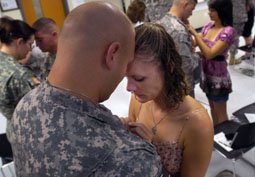By: Pamela Payne
As military families endure the multitude of conflicts of this generation, those on the outside might ask: “How do these families make it work?”
Well, a number of factors contribute to the success of military families as they face the challenges involved in serving our country, such as deployments, training missions and relocations. Many of the things that military families do to thrive under stressful situations could apply to many families, military or otherwise.
Families that have flexibility in their homes tend to do better than those who have rigid roles and rules. When deployment or change occurs, being able to shift and pick up the slack helps families adapt to change. The ability to shift roles and be flexible is often more important than who does what in the household.
So, for instance, if Dad always takes out the trash but Dad deploys, it is crucial that someone in the family take out the trash and pick up where Dad would have in his absence.
Families who engage in active coping of stressful situations are more successful than those who use passive coping strategies.
OK, so what does that mean? Families that actively discuss the stress, and pull together during challenging times, will do better than a family in which individuals keep their thoughts and feelings hidden from the other members of the family.
So if a child is stressed about a deployed parent, it is better for them to discuss those emotions and find activities that they can do with the remaining family members in order to cope with the stress. When families face these stressors together in a “head-on” fashion, they thrive compared with families that do not acknowledge or deal with the stressors.
Is there anything you can do if you live in a community where there are families coping with deployments? YES! You can help these families connect to the community on and off the military base.
Families that are connected to their local community were better equipped to handle the challenges of separation, and they were more satisfied with how they handled the stress of separation and reunion.
This connection to the community is particularly important for young families who may be dealing with their first deployment. They often have young children, and dealing with little ones during a deployment can be an added stress since there aren’t as many helping hands in the home. So this is your opportunity to reach out and offer that helping hand.
Connect with your neighbor, offer to watch the children so that this temporarily single parent can get a break, take a shower, enjoy their favorite TV show or whatever it is they may not be able to do when their children are around.
Now these tidbits of advice apply not only to military families who need community support, but to all members of a community. We need to help each other!
All families will experience trying times throughout their lives, and it makes a difference when they have help. Help can come in many forms — cooking meals, helping shovel snow, watching children, and many other ways in which we can lend our neighbors a hand.
So next time you see one of your neighbors driving down the street, wave, say hello and ask how they are doing. You may be able to change someone’s day with a simple smile or kind gesture!
Pamela Payne is on the faculty of the Weber State University department of child and family studies. The opinions expressed in this column do not necessarily reflect those of WSU.
The thoughts and opinions posted here are solely those of the author and do not reflect the views of AAFMAA.



